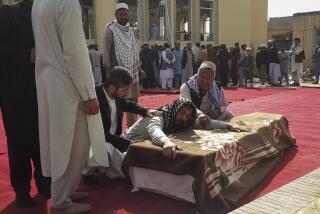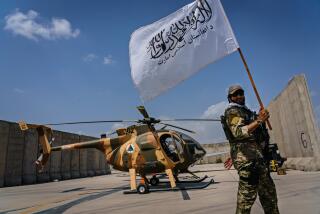Reagan Lauds United Afghan Resistance
- Share via
WASHINGTON — President Reagan, meeting with leaders of the Afghan resistance movement Thursday, praised the fractious forces for uniting their efforts and pledged that U.S. support for the resistance “will be strengthened rather than diminished.”
Reagan, calling the resistance movement’s greater internal unity a “political milestone,” said it also has “made itself felt on the battlefield.”
“During the past 18 months, the moujahedeen fighting inside the country have improved their weapons, tactics and coordination,” he said, resulting in “a string of serious defeats” for Soviet forces occupying Afghanistan.
However, in spite of his praise, Reagan stopped short of granting the guerrillas the stronger political commitment they had sought, a promise to recognize them formally as a government in exile. Such a diplomatic step might hamper U.S.-Soviet relations in advance of the Dec. 7 summit meeting in Washington, several Administration and congressional sources suggested.
Instead, sources said, the Administration placated the rebels with assurances that they will receive more sophisticated U.S.-made weapons that will allow them to step up their attacks against Soviet and government forces.
The guerrilla factions, which have been fighting Soviet occupation since December, 1979, this year for the first time chose a single chairman, Maulavi Younis Khalis. He led the delegation to meetings at the White House and with congressional supporters, and the group is scheduled to meet with Secretary of State George P. Shultz today.
In his appeal Thursday at the White House for formal diplomatic recognition, Khalis told Reagan that the Afghan rebels “would like increased political support and recognition for our movement, consistent with the increased military achievement that we have on the battlefield.”
‘Major Impediment’ to Ties
Although the President refused that request, he pointedly faulted Moscow for failing to set a date for withdrawal of its forces, in spite of his personal appeals to Soviet leader Mikhail S. Gorbachev.
“The Soviet presence is a major impediment to improved U.S.-Soviet relations, and we would like to remove it,” Reagan said. “The Soviets should want to do so as well.”
The Administration told the Afghan guerrilla leaders that they will receive sophisticated U.S. arms after the periodic transfer of Stinger missiles this year, Administration and congressional sources say. The weapons, some of which have been specially designed, are expected to allow the rebels to launch assaults on garrisoned Soviet forces through the winter.
Among the weapons soon to reach rebels in the field are long-range artillery, equipment to clear fields of land mines and rocket launchers designed to break through reinforced bunkers. Most of the equipment is designed to be stowed in backpacks or on mules, which the Afghan moujahedeen have received in large numbers from private American groups supplying humanitarian aid.
Sources say the weapons bound for the rebels will allow them to take advantage of the Soviet forces’ increasing isolation and their inability to take the offensive against the guerrillas in MI-24 Hind helicopter gunships. Sources said the rebels have been downing on average more than one Soviet helicopter per day using American Stinger and British Blowpipe missiles, and their successes have virtually grounded Soviet aircraft.
In past winters, the estimated 115,000 Soviet troops have been relatively safe within their reinforced garrison walls. The new American weapon shipments are designed to change that.
“The Soviets are on the run, and they’re burrowing down like little rabbits,” said Rep. Charles Wilson (D-Tex.), a member of the House Appropriations Committee’s defense subcommittee and a vocal member of the Congressional Task Force on Afghanistan.
More to Read
Sign up for Essential California
The most important California stories and recommendations in your inbox every morning.
You may occasionally receive promotional content from the Los Angeles Times.














